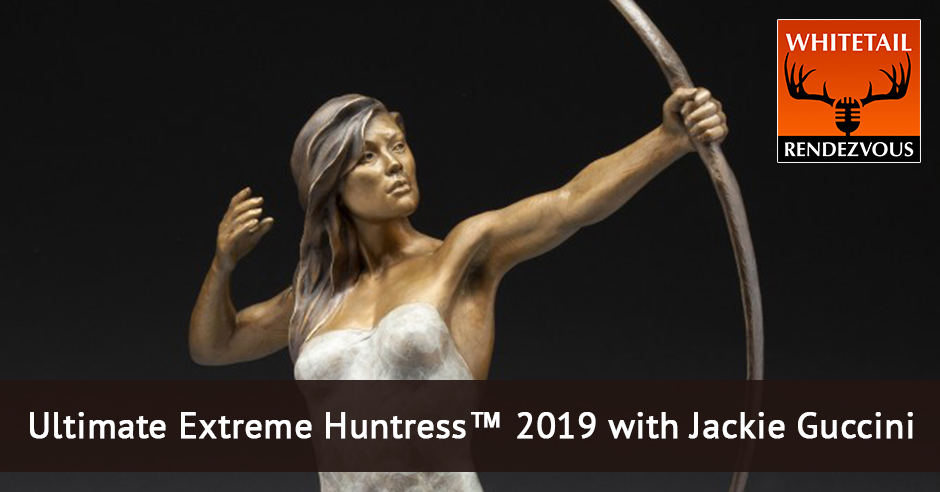
—
Listen to the podcast here:
Ultimate Extreme Huntress™ 2019 with Jackie Guccini
Introducing Finalist
I’m heading out to Western Colorado. A friend of mine, Jackie Guccini, is a finalist in the world’s Ultimate Extreme Huntress. Jackie, welcome to the show.
Thank you, Mr. Bruce, for having us. I appreciate it.
You’re from Louisiana. You’re working out in the oil fields of Western Colorado. How did you become an Extreme Huntress back in 2012? Let’s go back and start that so we can bring everybody up to speed. It’s important for them to vote before June 1st.
The way I became an Extreme Huntress was many years ago, I didn’t have a lot of money. I wanted to try different excursions and different hunts to go on. I had seen that they had those hunts where you submit your 500-word essay on your true passion for hunting. I submitted an essay on my true passion for hunting. I was chosen amongst ten women. The US voted on who they thought was the most Extreme Huntress. It was more like a competition where people voted from the essay who they thought was the most passionate hunter and who could compete here. What happened was I was chosen. I won that competition back in 2012. I got to go to Zimbabwe, Africa and hunt a Cape buffalo back then for a TV show called Eye of the Hunter. That’s how I got to where I’m at.
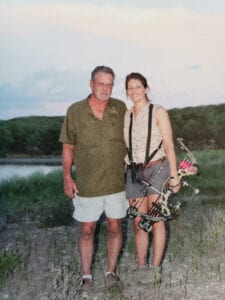
The reason I got there was that I had a passion for hunting and being in the outdoors. That was something that I loved and I wanted to share to the world. I’ve supported it since then because I know how it changed my life forever. It’s so important for me to do something different. It doesn’t matter who you are or where you come from or anything in life. What’s important is if you have a dream, you go after it no matter what it is. That’s what I’ve been chasing for years. Here I am again competing for the Ultimate Extreme Huntress. There are three other women I’m competing against. They’re amazing women. I’m going after again. We’ll be going back to Africa.
For the people who don’t know it, Extreme Huntress is a contest for women all around the world. Ulrika won it from Sweden. It’s been a lot of people. How did you become a finalist in the Ultimate Extreme Huntress?
It’s our tenth anniversary for 2019. We’re going to take four women. The four of us were chosen, the ones that were able to go at the time that they were going to be having the competition. That’s how I made it to the four. It’s Ulrika from Sweden, myself from Colorado, Lindsay Christensen from Idaho and Angie Tennison from Montana. All of us were previous winners of the Extreme Huntress Competition.
Tell people where they can go to vote. Do they have to vote by June 1st?
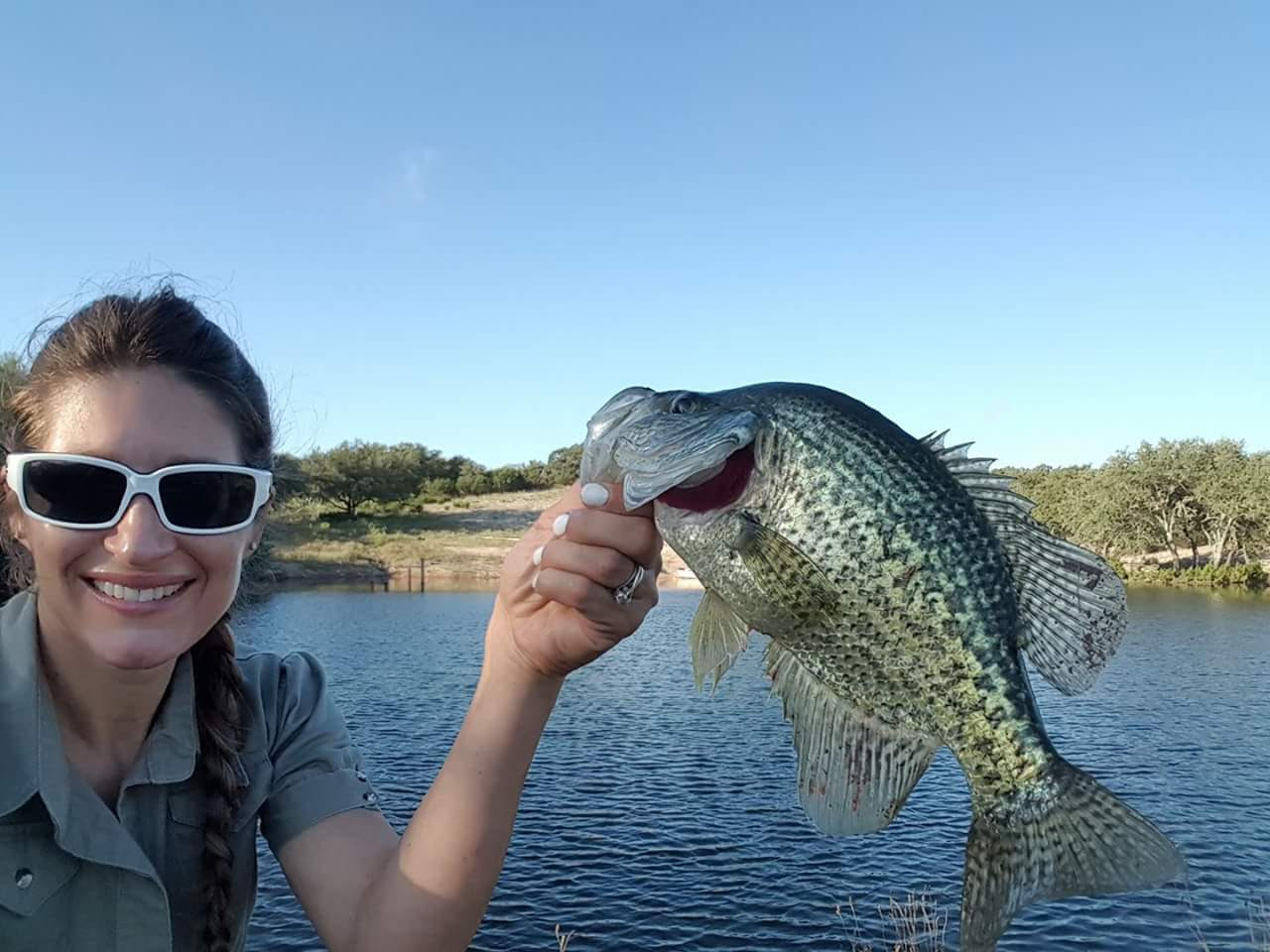
The first phase of voting is until June 1st. The second phase of voting is going to start on October 26 until January. It’s going to be the second phase where all the episodes air. The way that you got to a vote, you go to ExtremeHuntress.com. You scroll down to the bottom of their website. You can see the four finalists there. I would like for you to vote for me, but you can vote for whoever you want to vote for. We’re all in it for the same reason. We’re all winners already. You confirm your vote by entering your email address. You’re going to receive an email from Crowdsignal to confirm that you are not a computer.
What does the first segment of voting do? The second part is in October. Are they going to eliminate somebody?
Success comes to those who never quit and never stop dreaming. Share on X100% is the biggest score that you can make. I don’t know the percentages exactly. Voting is 25%. Your skills challenge is an additional 25%. The way the judges judge you is an additional 25%. How you hunt and how you present is an additional 25%. It makes a total of 100%. The voting will be a percentage of our score to meet the top of the level of 100%. Whoever has the highest to 100% will be the winner that they’re going to announce on January 2020 at Dallas Safari Club.
They’ll give you a new trophy.
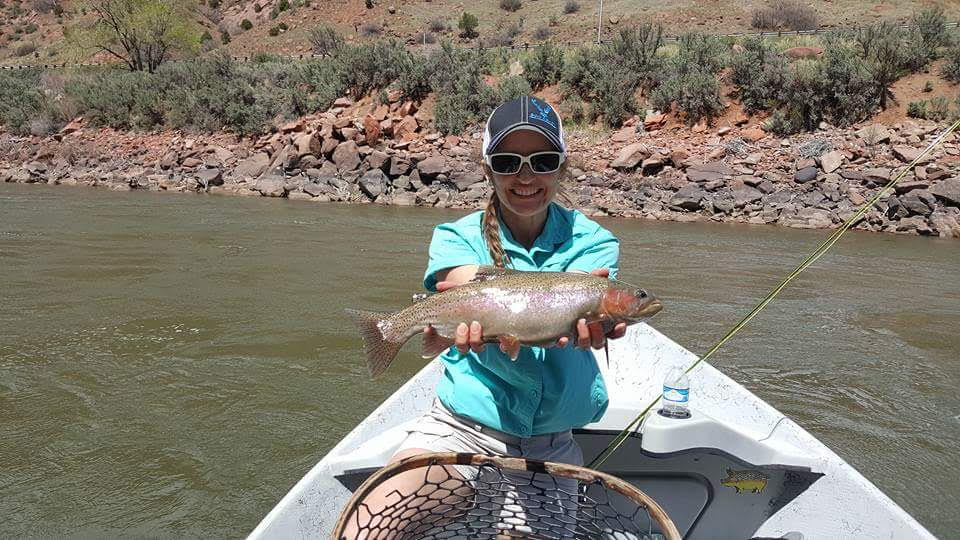
That’s what they’re going to give. It’s more than a trophy. Everybody goes, “What do you win?” It’s not about winning. It’s about this amazing opportunity. All four of us are getting called to the FTW Ranch in San Antonio. We’re going to compete at the military base there with Mr. Tim Fallon and his team. In July 1st, all of us plus the producers of the show and the judges fly out. We fly to the Savé Conservancy. DesFountain Safaris is the hunting group that we’ll be hunting with. The biggest thing is we’re going to be able to go out to the different hospitals, get to go out to the schools and be able to show the world that hunting is not about killing an animal, is not just about going out there and hunting a trophy. It’s about providing for other people and how important all of our dollars are.
It’s not about like, “Go and kill something.” It’s truly about how all our money goes to different schools, hospitals, water wells and everything in Zimbabwe. That’s going to be the message that we’re trying to deliver. It’s all expense paid. Nothing comes out of our pocket whatsoever. They pay for all of this. That’s a blessing. It’s the people we meet. It’s so amazing to be able to be like, “I’m on the radio with you.” We get to meet so many people and network because, all of us, no matter who you are, if you’re a hunter or a fisherman or outdoors, we all have the same passion. Some of us are at a little bit different levels of it. That’s what we are. That’s what I think is important. That’s my trophy. That’s how I feel.
Hunting in Africa, taking trophies in Africa and being a woman who hunts in Africa is probably the most maligned segment of the hunting community that there is. Kirstie Pike, CEO of Prois Hunting Apparel, is a good friend of mine. She shared with me some of the hate mail that she’s gotten. You want to throw up. You go, “That’s racist. That’s terrorist.” It’s flat ugly. It’s other women against other women. As men, I’d never had that. Women, you get so attacked and so maligned for doing something on the conservation because there are people in Africa that would not eat and that are hired by these outfitters and professional hunters. They get their protein and they get their food from the hunters. Hunters don’t take the meat back. The meat goes to use for all the trackers and all the families in the surrounding areas. When you think about that, everything’s consumed and the hunter pays for it. All the money goes into the local economy in Zimbabwe or wherever you’re hunting. It’s a huge thing. I’ll say this flat out, I don’t see any anti-hunter going to Africa feeding people, building wells, supporting hospitals, supporting schools and building schools like the hunting community does. You don’t do it.
It’s not even just in Africa. It’s here as well. A lot of people don’t realize that if we don’t hunt, fish and continue to do what we do, we could lose that. That’s a big thing that we have here. People act off of emotion nowadays. If you would think about it, where do you get your food from? For us, as hunters and anglers, we have to decide, “Are we going to do it ourselves, be conservationists and provide food on the table? Are you going to hire somebody to go kill an animal for you and go get your prime rib, your steak, your bacon, your chickens or whatever it is that you like and whatever it is that you eat?” A friend of mine told me, “There’s nothing happy about a Happy Meal from McDonald’s.” You can make that choice as a person to go say, “I’m going to put food on the table,” or “I’m going to go pay somebody to kill it and go order me some steaks from the store.”
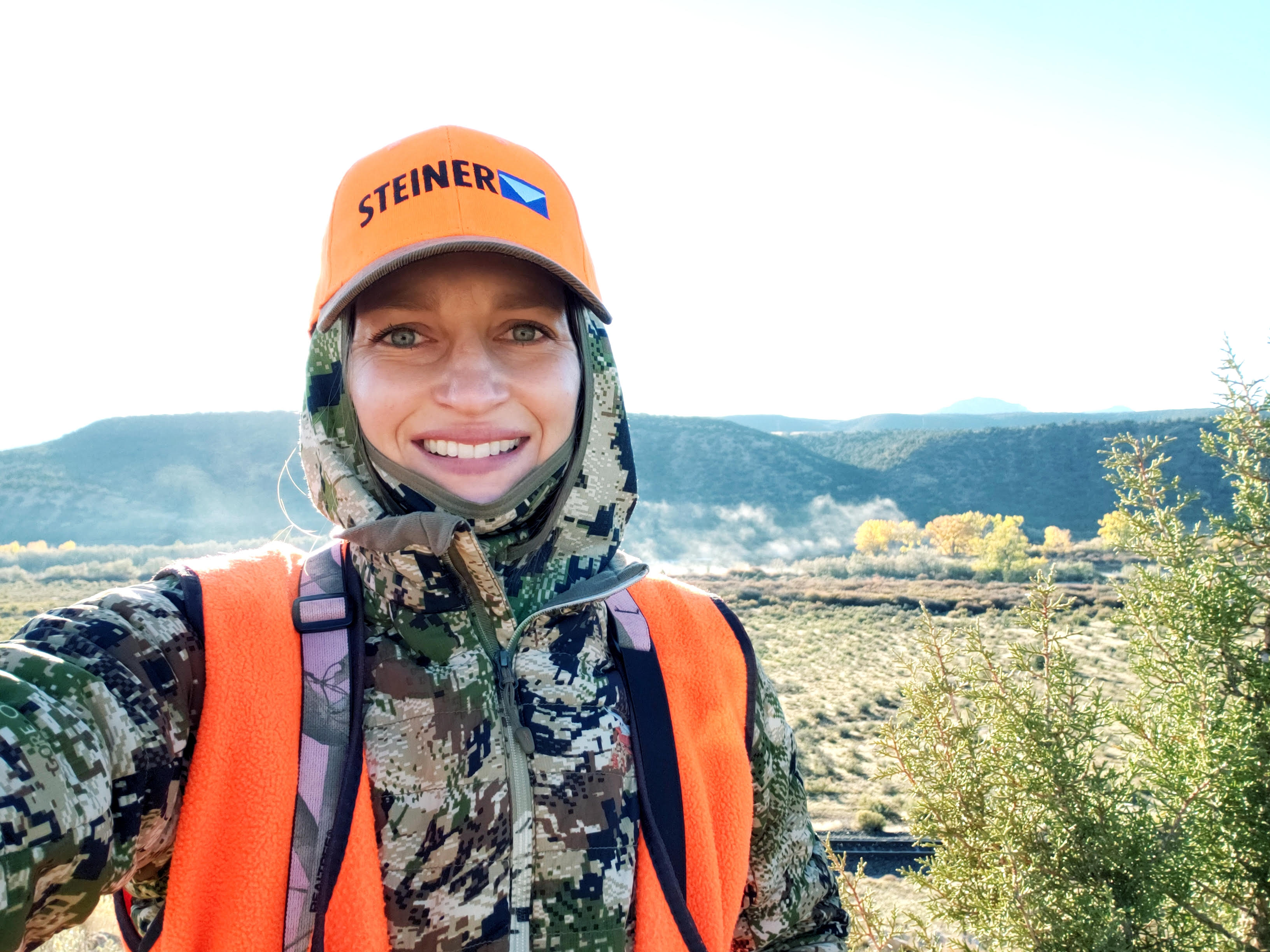
I don’t think people realize that hunters are providing for their families. Hunters are providing for other people. Our dollars that we spend goes to the roads, goes to the different waterways and goes to the properties and trails and everything else that people love to do. If we don’t do something about it, as far as conservationists, we could lose it. It doesn’t matter about how much scientific research we have. It doesn’t matter about anything like that. The most important thing, with all of that being said, is people act off of emotion. They could shut it down like that. It doesn’t matter what we have. No matter what scientific research, people act off of emotion.
Scientific research doesn’t matter. One thing that I’ve seen is how organic food is becoming, the craze and adult-onset hunters are a growing part of hunting. People, especially women, are saying, “I can do that. I can accept that challenge. I can go to Alaska. I can go in my back 40 and shoot a deer, butcher the deer, process the deer and have the deer feed my family for a few months. They get the best food they possibly can get. It’s organic. They didn’t have to go to the store and buy it.” They buy a license, which supports parks and wildlife. They buy a gun, pit them some money, and it goes to conservation. The whole hunters support hunting. If you’re a non-consumptive birder and you go out to take pictures of all the birds, the geese, the ducks, the eagles, the herons and all that, it’s great but you’re not paying for those birds to be there. The hunters, if they shoot ducks or if they shoot geese, then they’re supporting that. That’s available to everybody. People miss that whole point. Those are my two cents.
That is something that I’m passionate about. I provide for our family. I’m not going to lie. Our freezer was low. I had a cow tag. I was like, “We have to get something. We’ve got a whole family to feed.” It was hard for me. Now I have plenty of food and plenty of elk meat that’ll get me until next season. That’s all that we rely on as a family. No matter what it is that we’re hunting, it’s all meat in our freezer, from blackbuck jerky sticks to everything. I pack my lunch. I work in the oil field. I don’t have a microwave. Anything that I could take with me is great and everything that we harvest. My little boy and I harvested a turkey. We’re going to have a little turkey soup. That’s what is going to go in the crock-pot. Everything we hunt, we eat. That’s how we were raised and how we do it. We’ll make a goldfish taste good. That’s how we are. We like to cook and take care of our family.
The first part is worth 25%. You need to vote by June 1st. Let’s give a shout out to Tom Opre who started Extreme Huntress. Tom, we love you. Thanks for doing this. You’re helping hunting throughout the world. There’s no question about it. Who are some of the judges on the show?
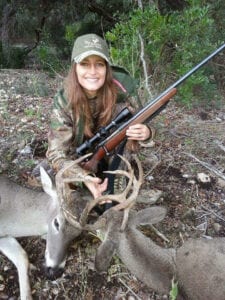
It’s Olivia Opre. Olivia and I competed against each other back in 2011 before I won for 2012. She and Tom fell happily ever in love and they got married. Olivia is a huntress. She’s hunted a lot of animals all across the world. She’s a great person to have as a judge. Mr. Larry Weishuhn. They call him Mr. Whitetail. I’ve been working with Mr. Larry for several years. I’ve had that great of an opportunity. Everybody’s like, “Why do you support this? Why do you continue this?” It’s because of the network and the people that I meet. I meet Meadow. I meet everybody that’s ever competed. I got to meet and have personal stories and share that passion with. That’s so important to me because that’s who I am. There’s only 4% of hunters out there and 6% of anglers if you do the research on it. That’s not a lot of people, if you think about it, compared to our world. Anybody that we can meet that loves this thing, to do the same stuff that I do, I want to go ahead and meet them and share a story.
You’re quite a fisherman. Do you catch fish on the White River?
Go out there and have fun. You only live once. Share on XThe trout, I caught it in the Colorado River. The big old crappie, I was at the YO Ranch. There’s Mr. Byron Sadler, who is the owner, the big dog. They didn’t need me because normally I’m behind the scenes for Extreme Huntress. I said, “Can I go and fish in that pond over there?” He was like, “You’re not going to catch anything.” Here I am whipping out all those crappies. I was trying to take selfies and everything. Mr. Byron goes, “Were you catching that in my pond?” I was like, “Yes, sir.” “You’re not allowed to fish in there anymore.” He had no idea those fish were in there and I tore them up. When I left for the competition, I was fishing spinnerbait. They had no idea about. They were eating everything that I threw out there. In 2009, I lived in Louisiana before I was transferred up here. I was the first woman to qualify to fish in Big Bass Classic in New Iberia, Louisiana. Fishing is my thing. I love hunting, but I also love fishing big time.
You’re passionate about the outdoors. What’s your message to women out there? Probably 30% of everybody who reads this blog is women.
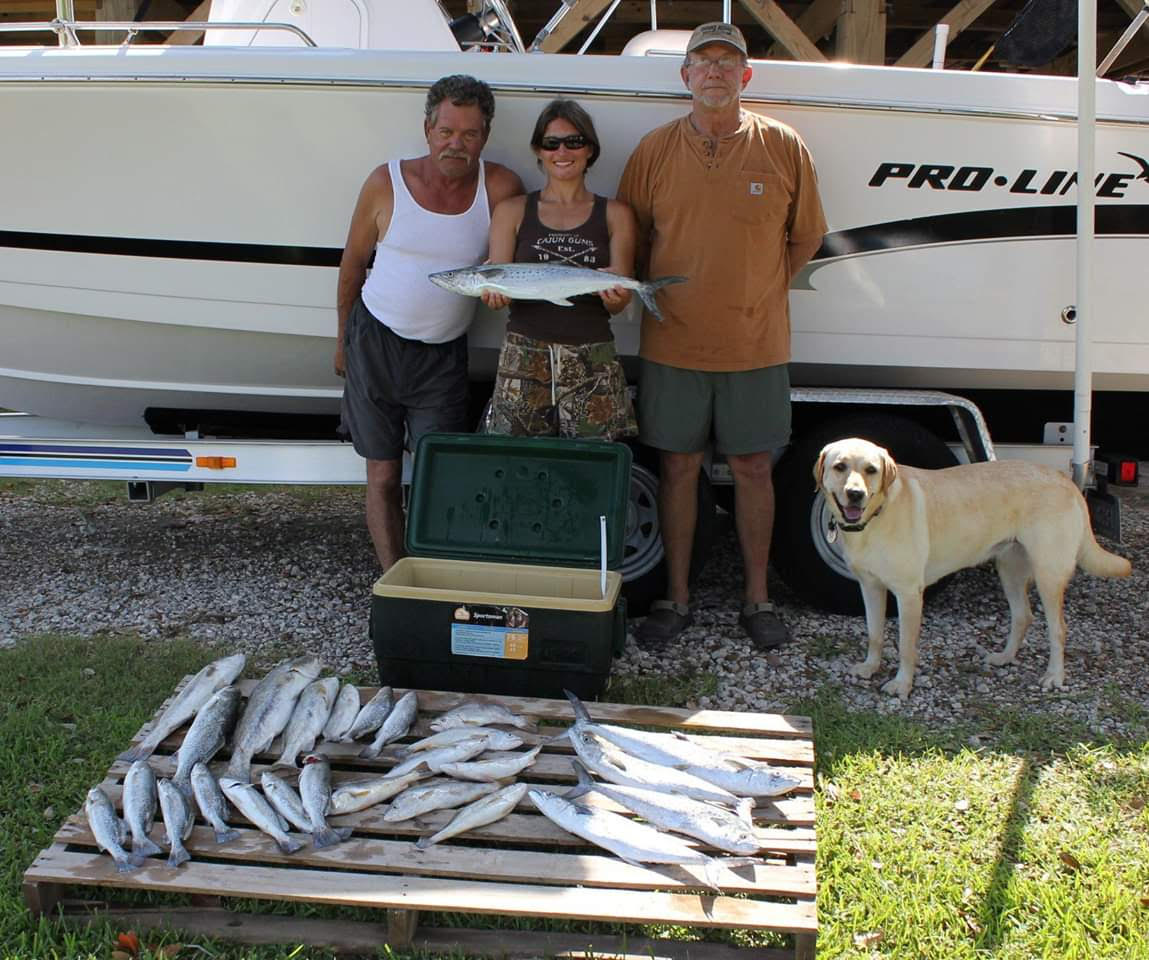
I would say to the women out there that don’t listen to your husband, your boyfriend or anything, come out here and have fun. It doesn’t matter what you know, what you don’t know. If you have any experience or no experience, we can all network together to do anything that you want to do. I help coordinate hunts. I help people who want to find different hunting attire or people that want to go fishing somewhere with women groups and stuff. The message I want to say is to go out there and have fun. You only live once. It doesn’t matter where you come from or what you know. There are so many people out there that can help. You can call me at any time. Always chase your dreams because you never ever know what can happen in life. I would be sincere about chasing your goals, follow your dreams and enjoy everything that you can whenever you’re given those opportunities.
What’s your tag line?
“Success comes to all those who never quit, never give up and never stop dreaming.” That’s my tagline on everything. With that being said, I grew up super poor. I know what it was like to struggle. I know what it was like to miss an opportunity. I haven’t shared this story in public. We were so poor growing up. I qualified for four events in my senior year in track. My parents can’t even afford to buy me track shoes to match the rest of the team. Somebody donated and bought me track shoes so I can match the whole rest of the team in my senior year. I’m super fast. I played college softball. That’s an example of how poor we were. That tagline, “Success comes to those who never quit, never stop dreaming,” I’ve always held onto that. My daddy always told us, “You go after anything you want. Anything that you want to do, you chase it. Nothing is ever too big for you to accomplish it.” That’s what I’ve done. Knowing where I came from and knowing where I’m at, that’s important to me. A lot of people from my Southern town in Louisiana, we got hit by a lot of hurricanes. They’re super poor there. They’re all happy. They know how I grew up. They see where we’re at now. That’s so special to me. It makes me so humble because I know their struggles and I kept chasing my dreams. That’s why it’s important for me to keep on going.
What do you think we can do to get more kids into the outdoors? It’s not just hunting, but fishing, camping, riding horses or getting them up into the West Elk Wilderness and spending time up there.
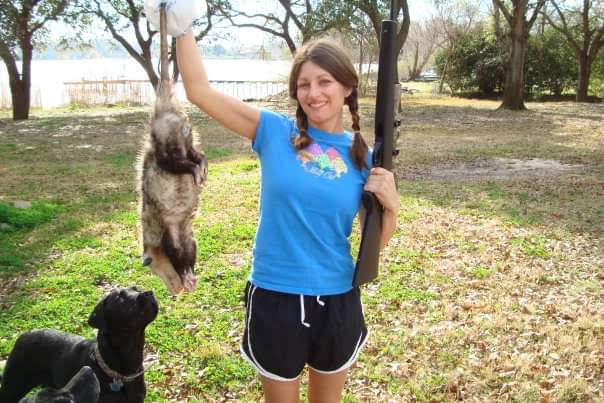
It’s not talked about a lot. They have the Garfield County Outdoors. Clint Whitley is the guy who manages that here in our area. There are a lot of things like that. It’s upbringing. Lisa and Donnelle are on your side of the slope over there. They do a few things.
Lisa and Donnelle are Hunting Divas. Check out the Hunting Divas on social media. They’re the bomb. Those ladies are incredible.
I love those girls. They’re awesome. Those are the things. We have social networking and stuff but, for the kids, we need to have places to go. We do have some areas out here on the BLM and public land, but it’s hard because everything is so far in the distance. If we could start them young somewhere, like on private property or somewhere where we could take them out where they’re in the woods and they get to experience that. It’s hard to find because a lot of people hold onto their property on the private side. On the public side, we have a lot of avenues but it’s super hard to try to get everybody together to do something. My girlfriend has a little boy and I have a little boy. We’re going to do moms and kids. We’re going to have a big camping. We’re going to go fishing. We might do archery. We’re going to have a little camping trip for moms and kids to take their kids out so we can all enjoy it together.
We can all chase our kids around, but also talk about hunting or fishing. Those are some of the things we’re going to be putting on this side of the slope. That way, we can try to get more people involved. A lot of us have kids. I’ve got a two-year-old. He’s going to be three. You know how big of a hassle that is. Some people don’t want to go hang out with their three-year-olds. Moms with three-year-olds, we can chase them together. Those are some of the things we’re going to be doing here. I help teach hunters ed over here on this side. That helps in having a community full of people. Trying to network to get everybody at one spot is the biggest challenge.
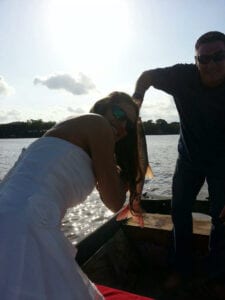
We’ve got the world’s Ultimate Extreme Huntress covered. Let’s talk about some of the hunts and some of the fun things you’ve done or the adventures you’ve had. It doesn’t mean that you took what you were after and got what you’re after. Let’s share some stories about your hunting and fishing experiences.
I’ll start with my precious hunting experience. It was on a Sunday. I got a turkey tag. Turkey is my big passion for hunting. I’m turkey crazy. I’m a big archery hunter. I flew in from Texas because I had to go to work in Texas. I got home late Saturday night because of the tornadoes. On Sunday, I saw my little boy. I was like, “Mommy’s going to go hunt a turkey. If you come with me, you have to be super quiet.” He was like, “Okay, mommy. I’ll be super quiet.” I bought him a little pretend shotgun on Saturday when I was in Junction. I’ve been watching the turkeys for a while. I know their pattern and stuff of what they’re going to do. I sat up. We live on three acres at waters BLM.
Always chase your dreams because you never ever know what can happen in life. Share on XI had my little boy with me. I knew the turkeys were coming down. I’ve seen them at a distance. Turkeys don’t go opposite directions. They stay on their pattern. I went out there. I was like, “You have to be super quiet. Please don’t pull the trigger.” His little gun makes noises. I have a bow. My husband was gone. It was just myself and a little boy. I think he felt my adrenaline because he got nervous. He was holding onto my leg. I was like, “Be very quiet. Don’t say anything.” He was holding onto me the whole time. I saw these turkeys come down. I drew back. I knew that yard already because I’ve had it patterned for a while. We wanted to harvest a good tom. He was a beautiful bird. I’ve harvested nine turkeys with my bow over the years. He was the prettiest bird I’ve ever hunted. My little boy was so excited. He feels like he shot it. That was so special to me because he was a part of the whole process.
We hiked all the way back down the house. I got my little turkey ruler to figure out how big he was. I took pictures. The funniest thing is I was like, “This is such a pretty bird. I’m going to take pictures.” I set up my tripod. I put my camera for ten seconds and I was running back to the turkey to try to fan it. I took about nine of those, ten pictures at a time. I got a few good ones. That happened on a Sunday. I was tagged out. I was super excited my little boy got to be a part of it. That was inspiring to me because I wanted him to understand that that’s important to us. His big thing is, “Mommy, are you going to put it in the freezer? Are we going to eat it?” I was like, “Yeah, we’re going to put it in the freezer.” The other thing about my little boy, his name is Chad. I named him after my PH that I hunted with in Africa. When I got to hunt in Africa, I hunted a Cape buffalo. That was a very exciting hunt.
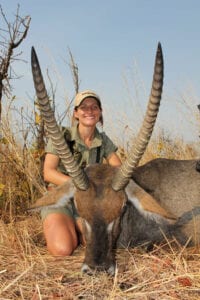
Did you hunt with a bow?
I hunted with a rifle, with a .375 H&H. It was a Blaser with 300-grain bullets. After I shot that puppy nine times, I felt like my teeth were going to fall out, like it’s ready to go. It beat me up pretty well. That was part of the Extreme Huntress. That was such an amazing experience. To give you how much I love hunting, I postponed my wedding that year so I could go hunting in Africa.
You’ve got an understanding husband. That’s for sure.
He came with me that year. He was super excited. Those are two stories.
Tell us about that Cape buffalo. Did you stalk him? Was it a spot and stalk or was it out of a blind?
We were in Zimbabwe whenever we hunted Cape buffalo. This goes around in 2012. The crazy thing is we were there for nine days. Day three was when Olivia and Tom had got married in Africa that year. They were charged by a Cape buffalo that they shot a couple of times. It kept coming at him. You could go watch it on YouTube on one of Tom’s shows. The buffalo slid to them. The PH came and had a rifle and shot the buffalo. Luckily, it didn’t gore them. It split three feet from them. They were telling us the story on day three. I was still hunting Cape buffalo. Day five came along. You could go watch all this too on Extreme Huntress and on Eye of the Hunter on Tom’s YouTube channel.
It was very hot. We went in October. It was hard work. It was a lot of spotting and stalking. Day five came along. My husband already had suffered heatstroke. The cameraman was struggling. We went to Lake Kariba to go take a little nap and rest. It’s a waterhole there in Zimbabwe. We called the boat to come back. It was a three-and-a-half hour drive to go to camp by truck, but an hour boat ride for them to come to pick us. We were exhausted. The boat was on its way to come and get us. The next thing you know, there’s a huge herd of buffalo that were drinking at the lake. We were like, “We’ve got to get ahead of them.” You could go watch. If you watch hunting shows, everything that is face-forward is normally reenactments of everything. If you see their butt or the back of people, it’s true. If you go watch that, you’ll see that they’re chasing. We’re running the whole time.
We ran around a circle to cut the buffalo off. They had this bull that was there. I was like, “Shoot.” I sprinted for it. It felt like twenty minutes, but it was probably only about ten minutes. We got around and I made a shot. He was moving when I shot. I shot him. Everything in Africa faces you. Where I hunted, I never got a broadside shot on anything unless it was a second shot. Everything faced me in Africa. I shot him in the shoulder. He stumbled. I long shot him right after that. I could hear him. He went into the bush. We went out there. They were like, “Shoot him again.” The funny thing is that the gun was so big. I shot him the third time in the back of his ear. They were like, “Shoot him again.” The way he was laid, it would’ve gone through his ear and into his heart. When I went to shoot him again, I fell on my butt because I was trying to squat down and use this big, old gun. We wanted to make sure because buffalo have a tendency to come back. They kill off 200 people a year, the Black Death.
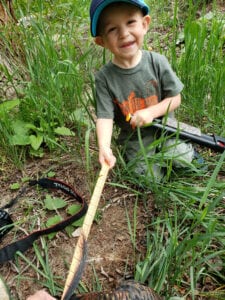
That happened. He was gone and stuff. Immediately, right after that, here comes the whole town. The whole tribe is coming out. They have machetes. They were all worshiping me. It was dinnertime. It was so crazy. We had the people that were with us, but this was coming out of the woodworks. I have no idea where they were coming from. There were buckets on their head. They went out there and they were shaking my hand. I don’t know what their language is, but they kept asking me for water. I would give them water bottles because they were thirsty.
They came there and they worshipped me a little bit. They were praising me because I had food for them. We took some pictures. We went and did a little reenactment. When we went back, there was nothing left. I’m not exaggerating. If you know the intestines and they drained it, it’s all you saw. There was nothing left for the lions, the coyotes, hyenas, whatever they have. They took it all. The way that it works there, in other countries as well as far as in Africa, they have a game scout with every hunter that goes out there and every piece of meat from different villages. Say you hunt in one village. You drive a few miles and you hunt somewhere else. All that meat is donated per village. That way, those people can have meat throughout the whole year. As hunters, it’s so true that we are providing the food there.
The natives are not allowed to hunt in those areas. They were so excited. They were so thankful for us coming there to hunt because we gave them all that food. I was so proud. That’s when I realized, “I’ve got to keep doing this.” It makes me emotional because we take for granted so much that we have here in America. Where does our water come from? Where does our food come from? I could drink a bottle of water right now. I could get me some Oreos or whatever it is that I want. They don’t have that there. They don’t know what it’s like to experience that. When I go, I’m bringing candy. I’m bringing clothes. I’m bringing shoes. I know how to pack up and hunt for many years. I’m going to bring them every single extra spot in my suitcase I can give to give to those kids and to give to those people. They are so thankful and blessed whenever we come there. I get emotional about it because it was truly something that changed my life forever. It goes back to, “Why do I support Extreme Huntress? Why do I support Tom Opre? Why do I support women in the industry?” Once you experience it, you’ll be hooked for life. The only way to continue people in this industry is for you to share your story with them and for you to show them or explain to them how we can make a difference. I get excited.
I’m humbled that you shared what you shared because that’s the heart of a huntress. There’s no way you can replicate that. You have to be there. You have to face death. Cape buffalo can kill you easily. I have one friend, Bobby Fontana. He got killed a long time ago. It had been a bull. He got snared. It abscessed his leg. He laid up in the bush and they happened to walk by. He was gored and stomped within seconds. It was over.
People act off of emotion. It doesn't matter how much scientific research we have, they get taken away in a second. Share on XThat happens a lot there. We’ve seen a lot of snares. We’ve seen a lot of poaching there. The unfortunate part is it happens every single day. The only thing you hear through social media is the negative part. Everybody has to know that. No matter who you are in the industry, they could turn anything the way that they want to turn it. A lot of people talk about trophy hunting. Why would you go after a trophy? Why would you go after a bigger animal? They don’t realize things like that. Whenever you get older, you get sick, and you can get diseases and stuff, a lot of people go after bigger animals because you have to keep the herd healthy and stuff. It’s the same thing in Africa. A lot of people are getting killed because of old animals or old elephants that come out there.
Another thing that a lot of people don’t realize is we don’t know what it’s like to have five elephants run through our building and eat all of our crops because that’s what they’re surviving off on. They technically need to have hunters go out there. That’s why it’s important for hunters to go out there. We, as hunters, will pay that price, whatever it is, for that elephant. Not only are we helping the ranchers and the subsistent farmers by their farm help not have to worry about being eaten up by elephants, but at the same time, we’ll be able to provide food if we would hunt or harvest that animal as well. That’s for buffalo or any animal that they have there.
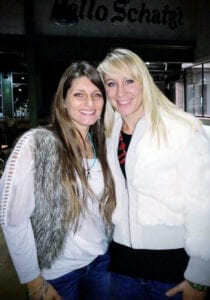 Another thing I learned is in North America, we got our mule deer, our whitetails, our elk, our moose, bison, our sheep, our mountain goat and our bears. I could keep going on. People don’t realize that they don’t have those animals in Africa. Their animals are their lions, their elephants, their kudu, their Impala, their Cape buffalo and hippos. Those are their species of animals. We have our species of animals in our country. When people see a zebra being shot or elephant, the only thing they could think about is, “I’ve seen that in a zoo. That’s so horrible.” They don’t look at a whitetail or a bear being a bad thing because that’s what they know here. The people in our country don’t realize that those are their animals. They don’t look at a zebra as a horse. They look at it as a piece of meat. That’s another message that people should educate themselves on. They don’t have a bear there. They don’t have an elk there. They have 82 species of animals in Africa. Our elk is their kudu. That’s super important for people to understand that. You see people with these different animals and stuff that they’re hunting there, but that’s their species, just like we have our species.
Another thing I learned is in North America, we got our mule deer, our whitetails, our elk, our moose, bison, our sheep, our mountain goat and our bears. I could keep going on. People don’t realize that they don’t have those animals in Africa. Their animals are their lions, their elephants, their kudu, their Impala, their Cape buffalo and hippos. Those are their species of animals. We have our species of animals in our country. When people see a zebra being shot or elephant, the only thing they could think about is, “I’ve seen that in a zoo. That’s so horrible.” They don’t look at a whitetail or a bear being a bad thing because that’s what they know here. The people in our country don’t realize that those are their animals. They don’t look at a zebra as a horse. They look at it as a piece of meat. That’s another message that people should educate themselves on. They don’t have a bear there. They don’t have an elk there. They have 82 species of animals in Africa. Our elk is their kudu. That’s super important for people to understand that. You see people with these different animals and stuff that they’re hunting there, but that’s their species, just like we have our species.
There’s one thing I want to share with any of us in the industry. This is important to me as well. I’m learning this as I get older with social media. Going back to the elephant situation, it could take me 30 minutes to explain to you how important it is about conservation in Africa or conservation here in America, how important it is to hunt that animal and to harvest that animal. It only takes one second of you watching a video of a bad shot or something being wounded to make that change in your brain, to make that have a negative feeling again. As hunters and anglers, we should think about that whenever we’re posting and stuff. Try to educate people that it’s not just about a kill. It’s more than that. It’s sharing your passion, your stories and stuff. We take so much of that for granted. That’s a message for us as hunters and anglers to try to show to folks. People act off of emotion. It doesn’t matter how much scientific research we have. They get taken away in a second.
Jackie, thank you so much for being a guest. Let’s do it again. I’d love to hear from you. You have the heart of a hunter. I’m sure you’ve read some of Robert Ruark’s books about Africa and Chapstick. Theodore Roosevelt went to Africa and helped establish some of the hunting preserves. There’s so much history that hunters have done an Africa to provide. That’s a message that I know you, Tom, Olivia and Larry are getting out. I wish you well in the contest. I can’t wait for you to be a guest on the show again.
Thank you so much for having me. I appreciate it.
Important Links:
- Jackie Guccini
- Ultimate Extreme Huntress
- ExtremeHuntress.com
- FTW Ranch
- DesFountain Safaris
- Prois Hunting Apparel
- YO Ranch
- Hunting Divas
- Garfield County Outdoors
- YouTube – Tom Opre’s channel
- @AmmoLand on Twitter
- @AmmoLand on Facebook
- https://www.Ammoland.com/2019/04/extreme-huntress-competition-goes-ultimate-in-africa/#ixzz5olsbDt78
- https://www.YouTube.com/watch?v=SvcIPCpdyq4
- https://www.Facebook.com/jacquelyn.gross1
- https://www.ExtremeHuntress.com/main/2019-voting-2/
- https://www.Facebook.com/extremehuntress/
- http://1043TheFan.com/165108/melanie-peterson-jackie-gross-guccini-terry-wickstrom-outdoors-11318/?
- https://www.Ammoland.com/2019/04/extreme-huntress-competition-goes-ultimate-in-africa/#axzz5olsT06FQ
About Jackie Guccini
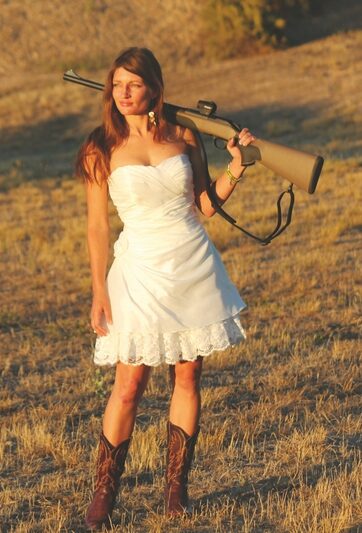 In an ordinary hunting season, Silt resident Jackie Gross would probably be found tracking elk with her fiance, T.J. Guccini, but this is not an ordinary year. Gross and Guccini flew to Zimbabwe, Africa, on Oct. 13, where Gross will hunt Cape buffalo. The trip marks the culmination of her year-long reign as Extreme Huntress 2012.
In an ordinary hunting season, Silt resident Jackie Gross would probably be found tracking elk with her fiance, T.J. Guccini, but this is not an ordinary year. Gross and Guccini flew to Zimbabwe, Africa, on Oct. 13, where Gross will hunt Cape buffalo. The trip marks the culmination of her year-long reign as Extreme Huntress 2012.
She earned the title after entering an annual contest. “I am always searching online for ways to fuel my passion and looking for more outdoor adventures, especially with hunting,” Gross said via email. “There aren’t many women in the industry. I want to help change that, so when I found the Tahoe Films’ Extreme Huntress Contest, I wrote a 500-word essay on why I was passionate about hunting. The essays were selected by judges and 10 essays were chosen as finalists.
The public/community voted on who they felt was ‘the most extreme.’”She won a new Blaser .375 H&H rifle with an interchangeable 300 win mag barrel, two Aimpoint red-dot sights, an African safari to hunt Cape buffalo, appearances and seminars at various hunting-related shows and retail outlets, and the opportunity to share her love of the outdoors and hunting with others. The safari will be filmed and aired on NBC’s “Eye of the Hunter” program in November 2012 and January 2013.
In a traditionally male-dominated sport and industry, Gross is glad to help promote changing attitudes about female hunters. “I see that society is coming around more to accepting women hunters nowadays, and I haven’t felt much resistance, but also I am not one to let those things bother me. I have my own journey,” she wrote. “I want to change the mentality of the everyday gals who think that they can’t do something because it costs too much or because it is too far away. I want to show them the stepping stones of your dreams are right in front of you.
Just when you run out of stones, don’t be afraid to keep walking. Only we can show the kids in the outdoors how to hunt, so if they see that we can, then they will pass the hunting lifestyle down to each generation.”Her own love for hunting started early, in her native Louisiana. “My dad and my brother taught me how to hunt birds. I grew up shooting ducks, geese, doves and pretty much anything that flew.
My parents and family taught me how to respect Mother Nature and only shoot what you can eat.”Gross and Guccini rescheduled their wedding plans to accommodate the dates for the Africa trip. “T.J. is very supportive in my hunting quest and my journey to help others become more involved in the outdoors,” Gross wrote. The couple frequently hunts together. “He has taught me many things as a huntress and, as a couple, it is the greatest feeling to know that my hunting partner is my best friend and my soon-to-be husband,” Gross said.
These days, her preferred hunt is for elk, with a bow. She described one of her hunts via email:”One time, after a two-hour hike to get to our spot, we realized we were being stalked by a mountain lion. The hair on my neck stood up, and then we realized a porcupine was on our trail as well. We got to our spot and started calling in the elk. A bull elk came running by me, bugling, and then another one almost ran me over, and we [the elk and] both jumped back, and he looked at me like, ‘That tree moved!’ He never knew I was there. I could have touched him on his nose as he walked by me, big as a horse. That excitement, the adrenaline that takes over, the teeth-chattering excitement is unbelievable.
Those are moments that no one can take from me, memories that I will never forget, and I will do it, again and again, every year.”As she learned growing up, she still hunts primarily for food, but admits to a bit of competition with her fiance.”T.J. has hunted bigger elk than me, but I have more trophy species. In the media world, they are more interested in big trophies, but we hope to have a nice trophy and meat. When I see wild game fly by or run by, all I can think is ‘Mmmmm, that would make a good gravy.’”The 2013 Extreme Huntress contest is currently underway, with an Oct. 25 deadline. The winner will have an opportunity to hunt brown bear in Alaska next year. “The contest is a great opportunity for women to involve themselves in hunting and to meet more ladies who are in the industry. I have met so many different people, and it is truly a blessing,” she stated.
